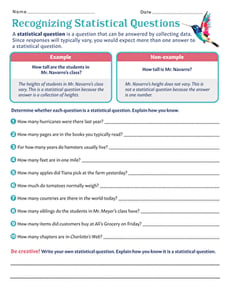Statistical Questions Resources
2 results
Math
✕Sort by:
2 results
Sort by:
About Statistical Questions Resources
On Education.com, statistical questions are used to gather data and analyze trends, helping students develop foundational skills in writing and interpreting questions that include inherent variability. Resources include printable worksheets, classroom activities, and lesson plans focused on identifying quantitative questions that can be answered through data collection. These strategies support math, science, and social studies education by emphasizing the importance of formulating questions suitable for statistical analysis.
Discover structured activities and interactive exercises on Education.com that teach students to recognize and create statistical questions. Children practice distinguishing between observational and experimental questions, learning how to frame inquiries that can be answered with data like counts, measurements, or averages. This content makes it easierParents and teachers to guide students through hands-on experiences that reinforce concepts in data collection and analysis.
Using these resources makes planning lessons and at-home learning more efficient by providing ready-to-use materials that encourage critical thinking and data literacy. Educators and parents can access engaging worksheets, worksheets, and interactive lessons that provide practical practice and reinforce classroom concepts. Together, these tools create a comprehensive approach for students to understand and apply statistical inquiries to real-world contexts.
Discover structured activities and interactive exercises on Education.com that teach students to recognize and create statistical questions. Children practice distinguishing between observational and experimental questions, learning how to frame inquiries that can be answered with data like counts, measurements, or averages. This content makes it easierParents and teachers to guide students through hands-on experiences that reinforce concepts in data collection and analysis.
Using these resources makes planning lessons and at-home learning more efficient by providing ready-to-use materials that encourage critical thinking and data literacy. Educators and parents can access engaging worksheets, worksheets, and interactive lessons that provide practical practice and reinforce classroom concepts. Together, these tools create a comprehensive approach for students to understand and apply statistical inquiries to real-world contexts.



